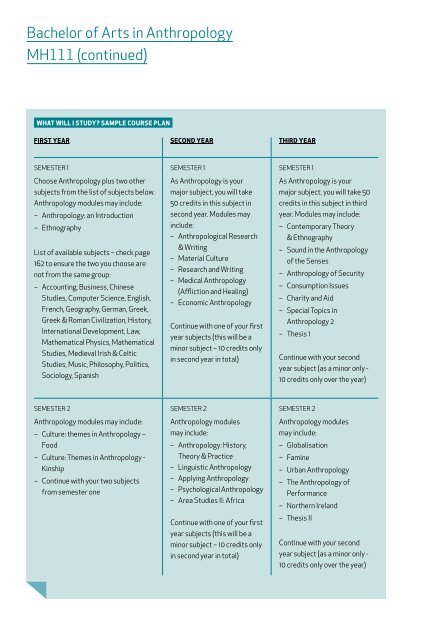Maynooth University Undergraduate Handbook 2015
Maynooth University Undergraduate Handbook 2015
Maynooth University Undergraduate Handbook 2015
Create successful ePaper yourself
Turn your PDF publications into a flip-book with our unique Google optimized e-Paper software.
Bachelor of Arts in Anthropology<br />
MH111 (continued)<br />
Degrees at <strong>Maynooth</strong> <strong>University</strong> 192 – 193<br />
What will I study sample course plan<br />
First year Second year Third year<br />
Semester 1 Semester 1 Semester 1<br />
Choose Anthropology plus two other<br />
subjects from the list of subjects below.<br />
Anthropology modules may include:<br />
––<br />
Anthropology: an Introduction<br />
––<br />
Ethnography<br />
As Anthropology is your<br />
major subject, you will take<br />
50 credits in this subject in<br />
second year. Modules may<br />
include:<br />
––<br />
Anthropological Research<br />
As Anthropology is your<br />
major subject, you will take 50<br />
credits in this subject in third<br />
year. Modules may include:<br />
––<br />
Contemporary Theory<br />
& Ethnography<br />
& Writing<br />
List of available subjects – check page<br />
––<br />
Sound in the Anthropology<br />
––<br />
Material Culture<br />
162 to ensure the two you choose are<br />
of the Senses<br />
––<br />
Research and Writing<br />
not from the same group:<br />
––<br />
Anthropology of Security<br />
––<br />
Medical Anthropology<br />
––<br />
Accounting, Business, Chinese<br />
Studies, Computer Science, English,<br />
French, Geography, German, Greek,<br />
Greek & Roman Civilization, History,<br />
International Development, Law,<br />
Mathematical Physics, Mathematical<br />
Studies, Medieval Irish & Celtic<br />
Studies, Music, Philosophy, Politics,<br />
Sociology, Spanish<br />
(Affliction and Healing)<br />
––<br />
Economic Anthropology<br />
Continue with one of your first<br />
year subjects (this will be a<br />
minor subject – 10 credits only<br />
in second year in total)<br />
––<br />
Consumption Issues<br />
––<br />
Charity and Aid<br />
––<br />
Special Topics in<br />
Anthropology 2<br />
––<br />
Thesis 1<br />
Continue with your second<br />
year subject (as a minor only -<br />
10 credits only over the year)<br />
Semester 2 Semester 2 Semester 2<br />
Anthropology modules may include:<br />
––<br />
Culture: themes in Anthropology –<br />
Food<br />
––<br />
Culture: Themes in Anthropology -<br />
Kinship<br />
Anthropology modules<br />
may include:<br />
––<br />
Anthropology: History,<br />
Theory & Practice<br />
––<br />
Linguistic Anthropology<br />
Anthropology modules<br />
may include:<br />
––<br />
Globalisation<br />
––<br />
Famine<br />
––<br />
Urban Anthropology<br />
––<br />
Applying Anthropology<br />
––<br />
Continue with your two subjects<br />
from semester one<br />
––<br />
Psychological Anthropology<br />
––<br />
Area Studies Ii: Africa<br />
Continue with one of your first<br />
year subjects (this will be a<br />
minor subject – 10 credits only<br />
in second year in total)<br />
––<br />
The Anthropology of<br />
Performance<br />
––<br />
Northern Ireland<br />
––<br />
Thesis II<br />
Continue with your second<br />
year subject (as a minor only -<br />
10 credits only over the year)<br />
Quick Facts<br />
CAO Code<br />
Leaving<br />
Certificate<br />
requirements<br />
MH111<br />
Points 2014 370<br />
Duration<br />
of degree<br />
Mature<br />
applicants<br />
UK, EU &<br />
International<br />
Applicants<br />
FETAC link to<br />
this course<br />
2HC3 & 4OD3 to include<br />
passes in English, Irish<br />
& a third language<br />
3 years (4 years<br />
with Erasmus/study<br />
abroad option)<br />
See page 317 for<br />
application details<br />
See page 323 for<br />
application details<br />
Yes – see page 319 for<br />
application details<br />
What can I do after my degree<br />
Our graduates progress into employment in a<br />
wide variety of careers. Anthropology has become<br />
increasingly important as a job skill in an informationbased<br />
global economy, where an understanding of<br />
cultural difference is increasingly crucial - from local<br />
to international contexts. Anthropology provides<br />
good preparation for a career in community work,<br />
education, the health professions, product design,<br />
international aid and development projects, NGO<br />
work, and business and administration. The holder<br />
of a PhD is a professional anthropologist qualified<br />
to teach at university level, to carry out advanced<br />
research, or to apply anthropology in the public or<br />
private sector, at the national and international level.<br />
what our students say - lucy newman<br />
“Anthropology has provided me with new ways of<br />
looking at the world, by thinking critically about my<br />
own and other cultures. In today’s globalised market,<br />
understanding other ways of being is a valuable<br />
skill. I’ve had some great experiences in <strong>Maynooth</strong>,<br />
from going to Spain on an ethnographic summer<br />
school, visiting Kilkenny on a research trip, being<br />
part of the Anthropology Society, and meeting<br />
great friends. I’ve always felt the Department<br />
were approachable and supportive of students”.<br />
Contact<br />
Anthropology Department<br />
Room 2.18, Rowan House (North Campus)<br />
Telephone: + 353 (1) 708 3984<br />
Email: anthropology.office@nuim.ie<br />
www.maynoothuniversity.ie/anthropology<br />
If you are interested in anthropology<br />
you might also like our degrees in<br />
Sociology through Arts......page 148<br />
Social Science.....page 179<br />
Lucy Newman, Student


